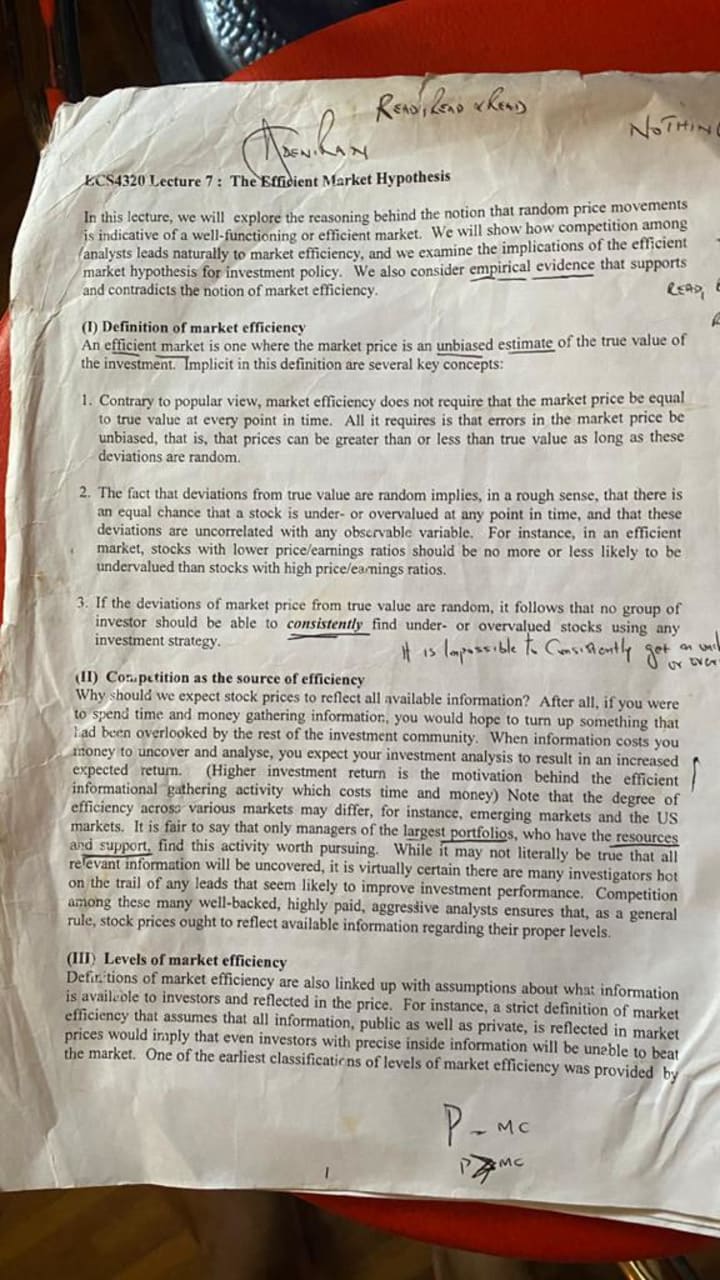The Efficient Market Hypothesis Is Dead.
With the volatility of the Capital Markets at an all-time high, leaving hedge funds to amass huge wealth at the expense of the wider society, isn't it time we consigned the efficient market hypothesis to the dustbin of finance history?

Nearly twenty years ago, I initially encountered the efficient market hypothesis on my postgraduate course, I swallowed it whole- with the unquestioning obsequiousness of a pseudo-intellectual- this was long before the near-crash of the global markets of 2008–9 and the subsequent punishing austerity policies of David Cameron and George Osborne.
What exactly is the efficient market hypothesis?
EMH implies the market price incorporates all necessary and relevant information and as a result, trade at or close to their fair market value. Implicit in this definition are a few key concepts(captured in my notes below):
Contrary to popular view, market efficiency does not require that the market value be equal to true value at every point in time. All that it requires is that errors in the market price be unbiased, that is, that prices can be greater than or less than true value as long as these deviations are random.
The fact that deviations from true value are random implies, in a rough sense, that there is an equal chance that a stock is under-or overvalued at any point in time, that these deviations are uncorrelated with any observable variable
If the deviations of market price from true value are random, it follows that no group or investor be able to consistently find under valued or overvalued stocks using any investment strategy.
Weak-form efficiency: Under weak-form efficiency, the current price reflects the information contained in past prices, suggesting that charts and technical analyses that use past prices alone would not be useful in finding undervalued stock.
Semi-strong form efficiency: In this form, the current price reflects not only information contained in past prices, but all public information, including financial statements and news reports.
Strong-Form efficiency: Under strong form efficiency, the current price reflects all information, public and private and no investor will be able to find the undervalued stock.
Based on the key concepts stated above by Professors Ken French and Eugene Fama, what's been the implication of this economic theory for the capital markets in the last 34 years?

Since the 19th of October 1987, we have had a number of convulsions in the capital markets, here are a number of them:
Wall street crash of 1987.
Black Wednesday, September 16th 1992.
Long Term Capital Management collapse of 1994.
Asian Tiger Economic collapse of 1997.
Dotcom crash of 2001.
Enron collapse of 2001.
Northern Rock, August 2007.
Lehman Brothers, Royal Bank of Scotland (RBS), Freddie Mac and Fannie Mae, Merill Lynch 2008–2009.
These seismic events, of the late 20th and early 21st Century, have repeatedly shown that the notion of efficient markets simply does not exist; Hedge funds, Political parties and Wall Street, under the watchful eyes of the CFTC and SEC, have colluded in orchestrating the greatest wealth transfer in the history of mankind, from the system to hedge fund managers and wall street, thus leaving the rest of humanity, billions of people in penury, whose wages have stagnated for a very long time.
Professor Eugene Fama, the founding father of Efficient Market Hypothesis has stood by his brainchild and rightly so, but one of his best-ever students, Cliff Asness, who went on to complete a doctorate in quantitative Finance, went on to establish a hedge fund called QAR and traded his way to billions, riding the crest wave of the volatility of the capital markets, eviscerating the notion of market efficiency.
Conclusion
With the current volatility of bitcoin, GameStop and silver, Universities in the English Speaking world, need a complete reappraisal of the teaching of Finance and Economics theory and that should entail the removal of ideas which have become redundant and the Efficient market hypothesis, is at the top of the list.
Thanks for reading.
About the Creator
Adebayo Adeniran
A lifelong bibliophile, who seeks to unleash his energy on a number of subjects






Comments
There are no comments for this story
Be the first to respond and start the conversation.